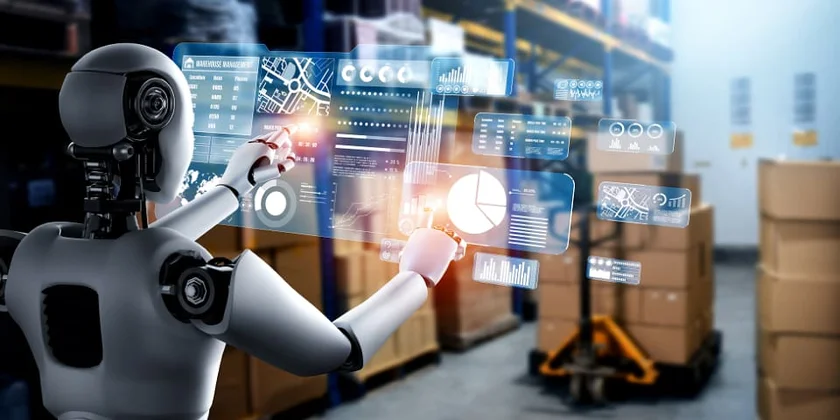AI in Logistics: Optimizing Supply Chains for Global Commerce – AI in Logistics Optimizing Supply Chains for Global Commerce is reshaping the landscape of global trade, making it more efficient and responsive to market demands. As businesses face increasing pressure to streamline operations and reduce costs, artificial intelligence emerges as a powerful ally in logistics. From predictive analytics to automated warehousing, AI technologies are transforming traditional supply chain methods into smart, data-driven processes that enhance productivity and customer satisfaction.
This revolution in logistics not only addresses the challenges of modern commerce but also sets the stage for a more interconnected global economy. By leveraging AI, companies can optimize routes, manage inventory more effectively, and anticipate consumer needs with unprecedented accuracy, ultimately leading to a more agile and resilient supply chain.
Ah, the ocean! A vast, mysterious expanse that covers over 70% of our planet’s surface, teeming with life and adventure. It’s a world that captivates our imagination and beckons us to explore its depths. Whether you’re a seasoned diver or someone who simply enjoys the beach from afar, the ocean offers a treasure trove of experiences waiting to be discovered. In this post, let’s embark on a journey beneath the waves, exploring the wonders that lie in the deep blue.
The Beauty of Marine Life: AI In Logistics: Optimizing Supply Chains For Global Commerce
One of the ocean’s most remarkable aspects is the incredible diversity of marine life. From the tiniest plankton to the majestic blue whale, the variety is staggering. Did you know that there are over 230,000 known species of marine life? And that’s just scratching the surface! Coral reefs, often referred to as the “rainforests of the sea,” are some of the most biodiverse ecosystems on the planet. They’re home to countless species, including colorful fish, sea turtles, and even the elusive octopus.

Coral Reefs: Nature’s Underwater Gardens, AI in Logistics: Optimizing Supply Chains for Global Commerce
Coral reefs are not just beautiful; they also play a crucial role in our ecosystem. They provide shelter and food for many marine organisms, acting as a nursery for juvenile fish. Unfortunately, these delicate ecosystems are under threat from climate change, pollution, and overfishing. It’s essential for us to protect these underwater gardens, as they are vital to maintaining the balance of life in our oceans.
The Mysteries of the Deep Sea
As we dive deeper into the ocean, we enter a realm filled with mystery and wonder. The deep sea is one of the least explored areas on Earth, and scientists estimate that around 80% of it remains uncharted. This dark and cold environment houses some of the most bizarre creatures you could ever imagine. Take the anglerfish, for example, with its bioluminescent lure that attracts unsuspecting prey in the pitch-black depths.
Bioluminescence: Nature’s Light Show
Speaking of bioluminescence, it’s one of the most fascinating phenomena found in the ocean. Certain species, like jellyfish and deep-sea fish, have the ability to produce light through chemical reactions in their bodies. This incredible adaptation serves various purposes, such as attracting mates, deterring predators, and luring in prey. Imagine swimming through a dark underwater world, only to be surrounded by glowing creatures—it’s like being in a sci-fi movie!
Human Connection to the Sea
Our relationship with the ocean goes beyond mere observation. For centuries, humans have relied on the sea for sustenance, transportation, and inspiration. Many cultures have deep-rooted connections to the ocean, celebrating its bounty through art, music, and folklore. Think of the ancient mariners, who navigated uncharted waters using the stars, or the countless legends of mythical sea creatures like mermaids and krakens.

Conservation Efforts: Protecting Our Oceans
As we continue to explore and enjoy the ocean, it is critical to remember our responsibility to protect it. Overfishing, plastic pollution, and climate change pose significant threats to marine ecosystems. Many organizations are working tirelessly to promote sustainable fishing practices, reduce plastic waste, and raise awareness about the importance of preserving our oceans. Simple actions like reducing plastic use, participating in beach clean-ups, and supporting marine conservation initiatives can make a big difference.
Adventure Awaits: Exploring the Ocean
The ocean is not just a place for research and conservation; it’s also an adventure playground! Whether you’re into surfing, snorkeling, or scuba diving, there are endless opportunities to engage with the marine environment. Picture yourself gliding through crystal-clear waters, surrounded by colorful fish, or riding the waves on a sunny day. Each experience offers a chance to connect with nature and appreciate the beauty of the underwater world.
Snorkeling: A Gateway to Underwater Exploration
For those who may not be ready to take the plunge into scuba diving, snorkeling is an excellent way to explore the ocean. With just a mask, snorkel, and fins, you can glide along the surface and witness the vibrant life below. Many popular snorkeling spots, like the Great Barrier Reef or the Maldives, offer stunning views of coral gardens and schools of fish. Plus, it’s relatively easy to learn, making it accessible for people of all ages!
Conclusion: Embracing the Ocean’s Wonders
The ocean is a magnificent and complex ecosystem that invites us to explore, learn, and protect. From the colorful coral reefs to the mysterious depths, it holds secrets and wonders that continue to inspire us. As we conclude our journey today, let’s remember the importance of conservation and strive to be responsible stewards of our oceans. Whether you’re a beach lover, an adventurous diver, or simply someone who enjoys the calming sound of waves, the ocean has something special for everyone. So, let’s embrace its beauty and work together to ensure its health for generations to come.
FAQ Insights
What is the role of AI in logistics?
AI helps optimize supply chain operations by analyzing data, predicting demand, and automating processes, which improves efficiency and reduces costs.
How does AI improve inventory management?
AI enhances inventory management by forecasting demand accurately, enabling companies to maintain optimal stock levels and reduce waste.
What challenges does AI face in logistics?
Challenges include data privacy concerns, the need for large data sets, and the integration of AI with existing systems and processes.
Can AI replace human workers in logistics?
While AI can automate many tasks, it is more about augmenting human capabilities rather than complete replacement, enhancing decision-making and efficiency.
What future trends can we expect in AI and logistics?
Future trends include increased automation, the use of autonomous vehicles, and more sophisticated predictive analytics to drive efficiency and responsiveness.



